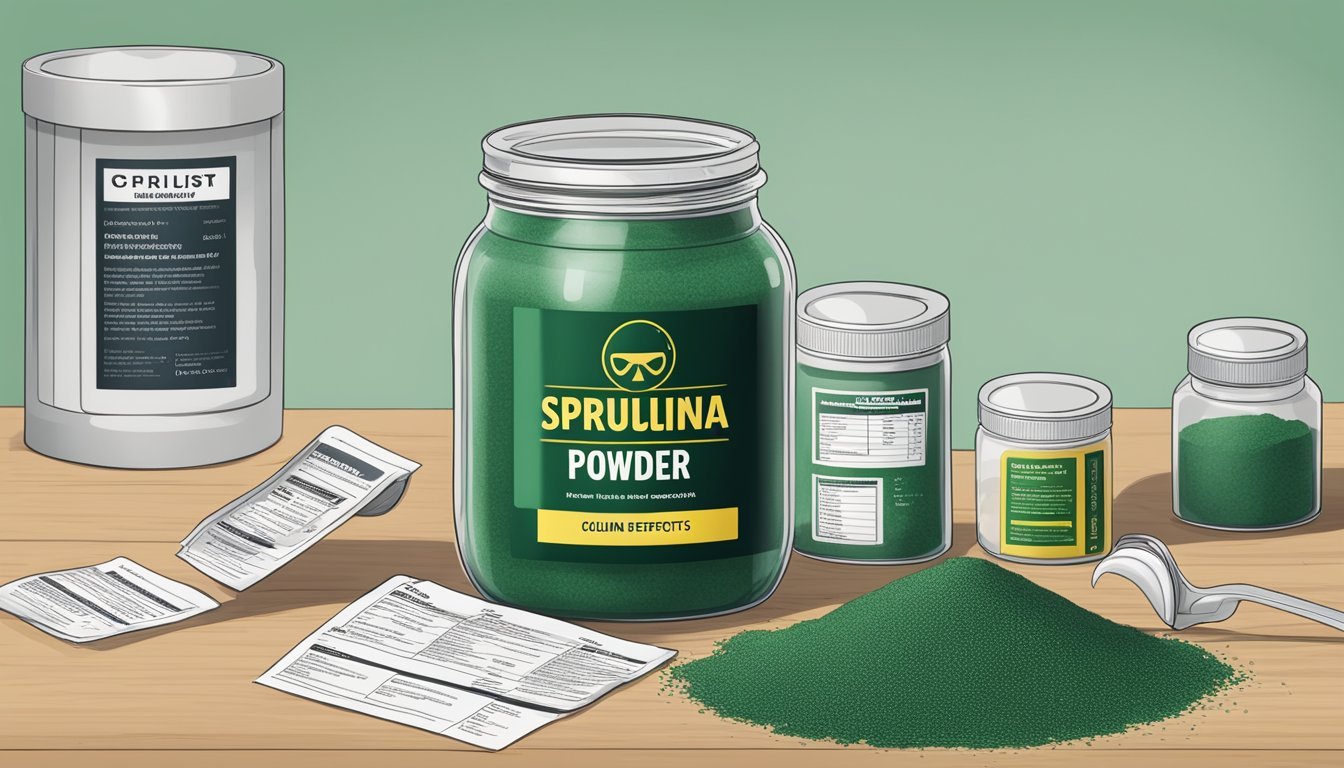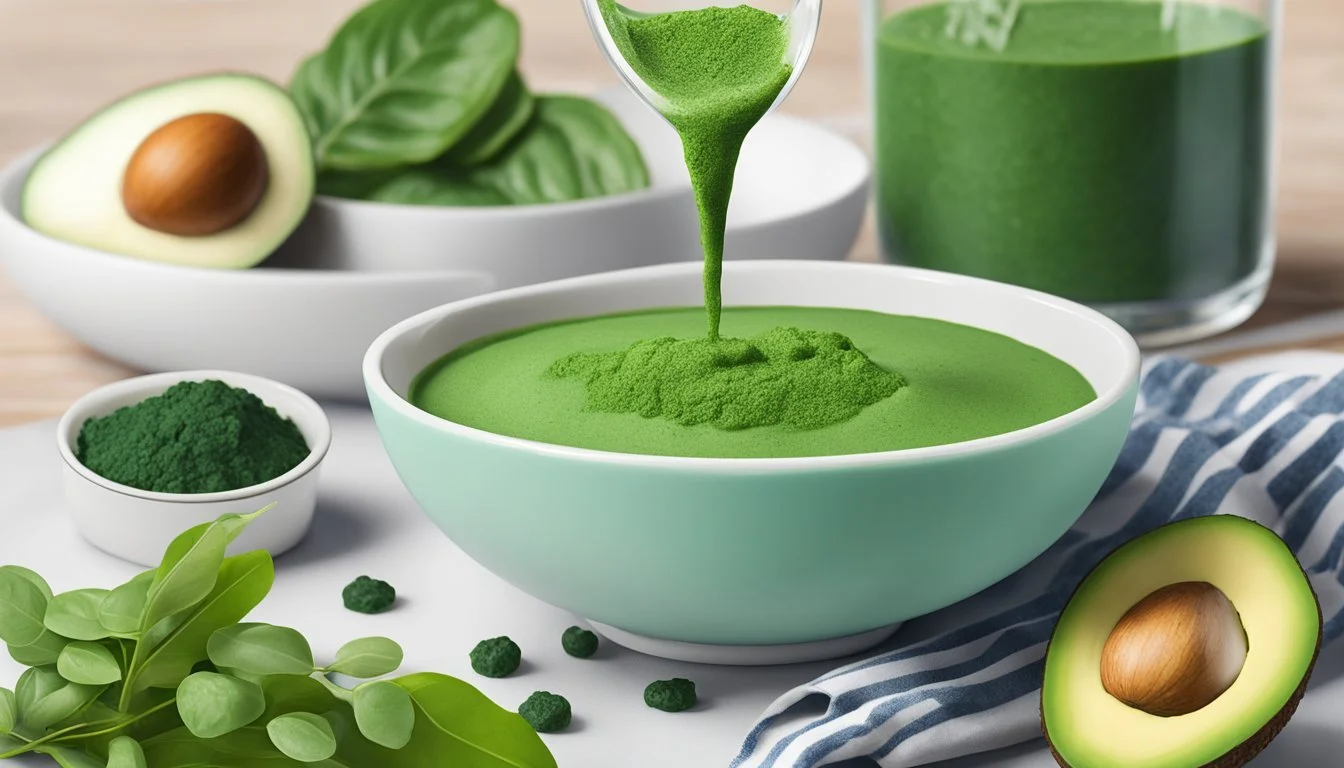Keto Diet: Spirulina Benefits and Its Impact on Low-Carb Lifestyles
The ketogenic diet has gained significant traction in the health and wellness community for its potential to promote weight loss and improve metabolic health. It is characterized by a high-fat, moderate-protein, and low-carbohydrate macronutrient distribution, which shifts the body's primary energy source from glucose to ketones. As individuals on a keto diet often seek nutrient-dense foods that align with this macronutrient profile, spirulina, a blue-green algae superfood, has garnered attention for its compatibility with the ketogenic lifestyle.
Spirulina, a microscopic algae known for its spiral shape, offers a rich and varied nutritional profile that includes proteins, vitamins, and minerals. Serving as an excellent source of protein, it can contribute significantly to the moderate protein requirement of the keto diet. It also provides a wealth of antioxidants and anti-inflammatory compounds, which can support overall health and may mitigate some oxidative stress associated with dietary changes.
The algae's low carbohydrate content makes it a suitable supplement for those following a ketogenic diet. Its nutritional benefits extend beyond macronutrients, as it is a source of thiamin, iron, and other essential micronutrients that maintain energy levels and support various bodily functions. Including spirulina in a keto diet could support weight management goals, considering its potential to influence metabolism and its nutrient density that can aid in satiety.
Exploring the Keto Diet
The keto diet is a high-fat, low-carbohydrate diet aimed at inducing a state of ketosis, where the body burns fat for fuel. This section will cover the fundamental principles of ketogenic dieting, its connection to weight loss, and the various benefits and risks associated with the diet.
Principles of Ketogenic Dieting
The ketogenic diet requires a drastic reduction in carbohydrate intake and replaces it with fats, resulting in typically 70-80% of calorie consumption coming from fats. Proteins are consumed moderately to maintain muscle mass, while carbs are limited to about 5-10% of daily calories. The goal is to create a metabolic state known as ketosis, where the body becomes efficient at burning fat for energy instead of carbohydrates.
Keto Diet and Weight Loss
Many individuals turn to the ketogenic diet for weight loss. Restricting carbohydrate intake forces the body to burn stored body fat for energy. Studies have shown that a keto diet can lead to a significant reduction in body weight and waist circumference, especially in those who are overweight or obese. However, weight loss results can vary, and long-term effectiveness requires sustained adherence to the diet.
Benefits and Risks of Keto Diet
Beyond weight loss, the keto diet may improve performance and offer health benefits such as better blood sugar management in people with diabetes. Other reported benefits include improved mental clarity and energy levels. On the flip side, some may experience the keto flu, presenting symptoms like fatigue and headaches during the initial adjustment period. Long-term risks may include nutritional deficiencies due to the restrictive nature of the diet. Therefore, careful planning and possibly supplementation are necessary to prevent these deficiencies.
Understanding Spirulina
Spirulina is a nutrient-dense, blue-green algae that offers a suite of health benefits. It stands out for its high protein content and rich array of vitamins and minerals, placing it firmly within the superfood category and making it a beneficial supplement for various diets, including keto.
Historical Use of Spirulina
Historically, spirulina has been a food source for centuries. The Aztecs utilized it for its nutritional value, harvesting it from Lake Texcoco and incorporating it into their daily diet. This ancient application roots spirulina in a tradition of natural sustenance.
Nutritional Profile of Spirulina
The nutritional profile of spirulina is impressive and includes:
Protein: It is composed of about 60-70% protein, which is more than most plant foods.
Fat: Contains essential fatty acids, including gamma-linolenic acid.
Minerals: A source of iron, calcium, and magnesium.
Vitamins: Rich in B vitamins, particularly vitamin B12, though not a reliable source for those on a vegan diet, and it provides vitamin K and vitamin A.
Using spirulina powder, one can easily boost the nutrient content of foods with just a small amount due to its condensed nutrient composition.
Spirulina as a Keto-Friendly Supplement
For individuals following a ketogenic diet, spirulina aligns well with their nutritional objectives. It has a low net carbohydrate content which supports maintaining ketosis. Moreover, while emphasizing fat and protein intake, the diet can benefit from the micro-nutrients that spirulina provides. There have been claims about anti-cancer properties and other health benefits, but while this superfood holds potential, these claims should be viewed with caution and based on ongoing research.
Health Benefits of Spirulina
Spirulina, a nutrient-rich blue-green algae, is recognized for contributing to various health benefits including heart health, glycemic control, immune function, and digestive wellbeing. Its potent antioxidant and anti-inflammatory properties make it a valuable addition to the keto diet.
Spirulina for Heart Health
High in antioxidants, Spirulina is beneficial for heart health. It is known to help in reducing cholesterol levels, specifically 'bad' LDL cholesterol, and may prevent LDL oxidation in the arteries, which is a key factor in the development of atherosclerosis. Additionally, Spirulina can assist in maintaining healthy blood pressure levels, potentially lowering the risk of stroke.
Spirulina's Role in Blood Sugar Management
Regular consumption of Spirulina may aid in blood sugar management. It helps to improve insulin sensitivity and could reduce fasting blood sugar levels. These effects can be particularly beneficial for individuals following a keto diet, as stable blood sugar levels are key for sustaining ketosis.
Immune Function and Spirulina
Spirulina supports the immune system thanks to its high content of vitamins and proteins. It may increase the production of antibodies and infection-fighting white blood cells, ensuring a robust response to pathogens, including those that cause the flu.
Spirulina and Digestive Health
Spirulina contributes to digestive system health by maintaining a balance of beneficial gut flora and could alleviate inflammation in the digestive tract. Its rich protein content, coupled with essential amino acids, promotes the repair and growth of tissue, thereby supporting the overall health of the digestive system.
Nutritional Synergy of Keto and Spirulina
The ketogenic diet and spirulina supplement each other, providing metabolic benefits, reduction in inflammation, and an enhancement of ketosis, all of which are critical for those following a keto lifestyle.
Metabolic Advantages
The ketogenic diet is a high-fat, moderate-protein, and low-carbohydrate diet that shifts the body's metabolism away from carbs and towards fat and ketones. Spirulina is low in calories and carbohydrates, which aligns well with keto principles. This dietary supplement has a high protein content, with all nine essential amino acids present, aiding in the maintenance of lean muscle mass during weight loss. It also contains omega-3 fatty acids that can improve the lipid profile, particularly by lowering triglycerides.
Combating Inflammation
Chronic inflammation can be mitigated by the high antioxidant content found in spirulina, as antioxidants are known to neutralize free radicals. The keto diet also has anti-inflammatory potential due to its restriction of high-carb foods which can trigger inflammatory responses. Thus, incorporating spirulina can provide additional anti-inflammatory compounds, such as phycocyanin—the pigment that gives spirulina its distinctive blue-green color.
Enhancing Ketosis with Spirulina
Spirulina may contribute to the keto diet's goal of maintaining ketosis, the metabolic state where fat is burned for fuel in the absence of dietary carbohydrates. It is not only low in carbs but also rich in nutrients that can be depleted during a keto diet, including B vitamins and minerals like iron and calcium. Moreover, the inclusion of spirulina can help support the nutritional balance by providing these essential nutrients without compromising the state of ketosis.
Potential Risks and Side Effects
While spirulina offers nutritional benefits, it is crucial to be aware of its potential risks and side effects. These can range from concerns about heavy metal contamination to digestive issues and allergic reactions. It is advisable to consult with healthcare providers before adding spirulina to one's diet, especially for individuals with pre-existing health conditions or those pregnant or nursing.
Spirulina and Heavy Metals
Spirulina is sometimes found to be contaminated with heavy metals, such as lead, mercury, and arsenic, if harvested from polluted waters. Consuming heavy metal-contaminated spirulina can lead to serious health issues, including neurological problems and kidney damage. Individuals should ensure that their spirulina comes from a reputable source that tests for toxins.
Digestive Discomfort and Allergies
Side effects such as constipation, bloating, and nausea may occur, especially when consuming spirulina in large quantities. Additionally, some individuals may experience allergic reactions, which can include skin issues like itching or hives. It is essential to start with small doses of spirulina to monitor the body's reaction.
Consultation with Healthcare Providers
Before integrating spirulina into one's diet, particularly in supplement form, consulting with a doctor, nutritionist, or registered dietitian is advised. They can provide guidance on appropriate dosages and help identify any potential risks based on individual health profiles. This step is crucial to prevent adverse effects, such as headaches or digestive issues, from occurring.
Incorporating Spirulina into a Keto Diet
Spirulina, a nutrient-rich algae, complements the keto diet by providing essential vitamins and minerals without excess carbohydrates. It can be seamlessly added to various keto-friendly foods.
Recipe Ideas for Spirulina
Incorporating spirulina into one’s keto diet is made easy through various recipes. Smoothies are a straightforward option, as spirulina powder can effortlessly blend into the mix, adding a nutritional boost without altering the taste significantly. A typical recipe could include a blend of avocado, spinach, keto-friendly sweeteners, and a tablespoon of spirulina powder to create a nourishing green smoothie.
For snacks, try creating Spirulina Chocolate Bites by mixing melted cacao butter with cacao powder, a sugar-free sweetener like powdered Monkfruit, and a tablespoon of spirulina powder. This concoction can then be poured into molds and set to create a satisfying, nutrient-packed treat.
Recommended Spirulina Intake
The general recommendation for spirulina supplementation is one to three grams per day. However, since it contains 39 grams of protein per ounce, individuals should adjust the amount based on their daily protein requirements and overall dietary intake to ensure they stay within their macronutrient goals for a ketogenic diet.
Finding Quality Spirulina Supplements
When choosing spirulina supplements, it's crucial to opt for high-quality products to ensure purity and potency. Seek supplements that have been tested for heavy metals and contaminants and come from reputable sources. Spirulina is available in various forms, such as tablets and powders, allowing for flexibility in how it's incorporated into the diet.
Conclusion
This section brings together the pertinent aspects of incorporating spirulina into a ketogenic diet and contemplates the potential developments in this domain.
Summary of Spirulina in Keto Dieting
Spirulina, a nutrient-dense algae, has been recognized for its high protein content, essential amino acids, vitamins—including B12—and minerals like iron and calcium. Its integration into a ketogenic diet, which prioritizes low carbohydrate and high fat intake, could potentially support weight loss efforts and augment nutritional intake. Users of the ketogenic diet have reported weight reduction, and the nutrition profile of spirulina may contribute beneficially to heart health and blood sugar stabilization.
Future Perspectives
As research progresses, the health benefits of spirulina within a ketogenic framework warrant further exploration, especially in the spheres of metabolic health and chronic disease management. Future studies could provide a quantifiable assessment of how spirulina might influence the overall effectiveness of the ketogenic diet, perhaps offering refined dietary guidelines that harness both the weight loss capabilities of ketosis and the nutritional advantages of spirulina.






